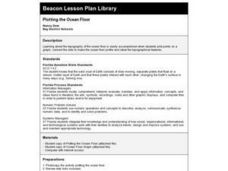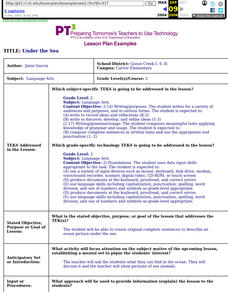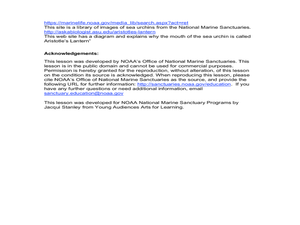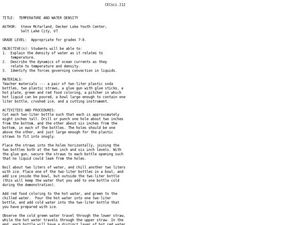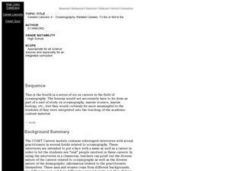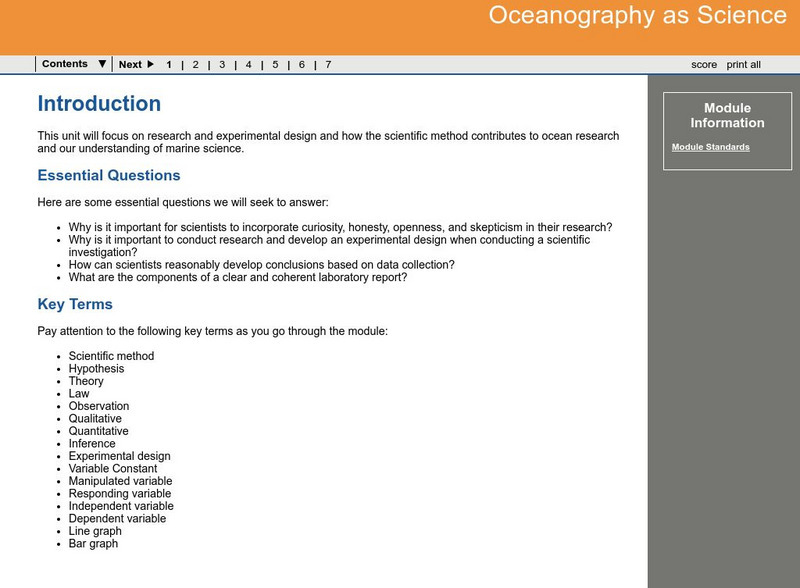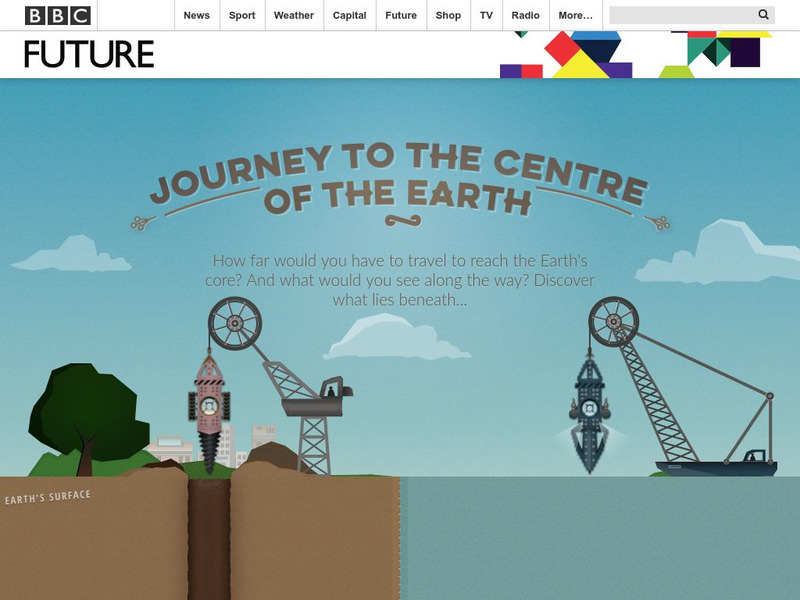Curated OER
Oceanography
Fifth graders use scientific skills and processes to recognize how living things depend on one another and on the environment for survival and that the human use of natural resources impacts the environment. They research how Earth's...
Curated OER
Ocean Currents
Fourth graders work in groups to research ocean currents and create posters with their findings. They locate the patterns and names of major ocean currents and identify them on a map. Students also use red pencil to show ocean currents...
Curated OER
Ocean Mythology
Pupils examine Greek and Roman mythology concerning the oceans and humankind's relationship with them, and create presentations to share with classmates.
Curated OER
Plotting the Ocean Floor
Fourth graders plot points on a graph, connect the dots to make the ocean floor profile and label the topographical features. They utilize a worksheet and a website imbedded in this plan to plot the ocean floor.
Curated OER
Under The Sea - Describing an Ocean Picture
Second graders create original complete sentences to describe an ocean picture under the sea. After a lecture/demo, 2nd graders use a software program to create their own undersea scene, complete with pictures and writing.
Curated OER
Obis Oil Spill
Students explore environmental challenges by participating in an oil spill simulation. In this water safety lesson, students discuss why oil spills happen and how their impact affects the entire ecosystem. Students utilize popcorn,...
Curated OER
Sea Urchins - Diadema Antillarum
Students investigate oceanography by painting sea life. In this crustacean lesson, students identify sea urchins in our ocean environments and describe the functionality of their spherical-shaped bodies. Students design their own sea...
Curated OER
Temperature and Water Density
Students consider the effects of temperature on water density. In this Earth Science lesson, students evaluate a demonstration of cold and hot water currents in a model. Students use two liter bottles and varied water temperatures with...
Curated OER
Branches of Science
In this branches of science worksheet, students are given one page of pictures related to four branches of science. These include astronomy, meteorology, oceanography and geology.
Curated OER
History and Oceanography
High schoolers identify the accomplishments in oceanography from 17th-19th century, construct a time line with the scientists in chronological order, and discuss the parallels of oceanographic contributions with those in other areas of...
Curated OER
What Do These People Know That I Don't Know?
Students research career areas within the field of oceanography. They read interviews of people who work in these fields and discuss how the fields are similar. They write a paragraph or more telling what career choice sounded most...
Curated OER
Oceanography-Related Careers: To Be or Not to Be. . .
Students investigate various careers in the field of oceanography. They conduct Internet research, record data on a spreadsheet, write a justification to explain why someone should accept a position found online, and write a letter to a...
Curated OER
Researching the World's Oceans
Students research and compare important features of the oceans based on current data. They examine the globe or map, determine the major oceans of the world, and record their names on the data sheet.
Curated OER
If I Can't See It, How Do I Know It's There?
Students build a model ocean using a variety of materials representing the various levels of the ocean. They collect data about the ocean floor in a partner activity. They practice working with topographical mapping grids.
Curated OER
Oceanography Class Quilt
Students create and observe a collage of oceanography topics that be placed on quilt tiles in a culmination art project to represent information learned.
American Museum of Natural History
American Museum of Natural History: Oology: Expeditions
This student module includes short, informational text, images, interactive games, and quizzes about ocean exploration.
Georgia Department of Education
Ga Virtual Learning: Introduction to Oceanography
Students focus on the four branches of oceanography; chemical, geological, physical and marine oceanography, and how the scientific method contributes to ocean research and our understanding of marine science.
Georgia Department of Education
Ga Virtual Learning: Oceanography as Science
Students study research and experimental design and how the scientific method contributes to ocean research and our understanding of marine science.
BBC
Bbc Future: Journey to the Centre of the Earth
Explore deep underground and deep in the ocean to discover what lies beneath the surface. Don't stop until the final destination: the core of the Earth.
Rice University
Rice University: Ocean Currents and Tides
This URL will start you out at the site map for Rice University's study of longitude and navigation. Scroll to the section titled "Oceans" and you will find some very good information on surface currents, especially those of the South...
Woods Hole Oceanographic Institution
Woods Hole Oceanographic Institution
A non-profit center for applied ocean and physics engineering, biology and marine chemistry and geochemistry with a focus on physical oceanography.
University of Washington
Aquatic Organic Geochemistry
Learn about what the University of Washington has to offer in their institute of Oceanography including apprenticeships, river studies, and demineralization.
Tramline
Tramline, Inc.: Virtual Ocean Field Trip
In this enchanting site, students will learn basic principles about oceans and will be introduced to an assortment of sea life, both plant and animal. Other interesting ocean links can be found on the teacher resource section of this link.
Science Education Resource Center at Carleton College
Serc: Ocean World
A link to a website with information about the ocean. Learn about ocean processes, oceanography, physical oceanography, and get real-time ocean data. Site contains college-level and beyond textbook as well as teaching materials.





